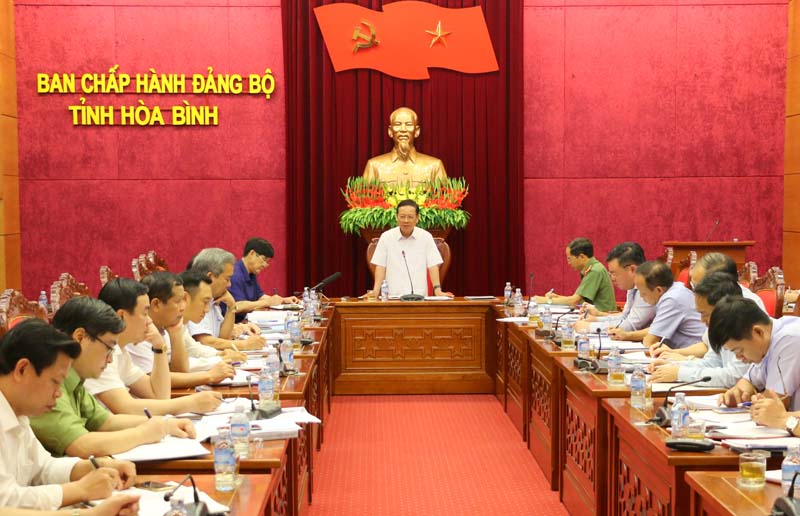
(HBO) - Bui Van Tinh, member of the Party Central Committee and Secretary of the Hoa Binh provincial Party Committee, had a working session with officials of the Party Committees of Luong Son and Lac Thuy to discuss the building of these two localities into new-style rural districts in 2020.

Bui Van Tinh, member of the Party Central Committee and Secretary of the
Hoa Binh provincial Party Committee, addresses the working session.
By the end of 2018, Luong Son had had 11 of the
19 communes recognised as new-style rural areas. Each commune in the district
fulfilled 17.63 criteria on average, up 1.42 criteria from 2017. Luong Son has
yet to meet two standards - transport and health care-culture-education.
The communes that haven’t obtained the new-style
status were asked to complete the dossiers seeking the recognition in September
this year.
Meanwhile, the communal township of Luong Son
and its planned extension area have basically gathered all necessary conditions
to become a fourth-tier city.
In Lac Thuy district, eight of its 13 communes
have been named new-style rural areas. Each commune satisfied 16.92 criteria on
average, up 1.23 from 2017. Lac Thuy aims to reach all standards in 2020 and
apply for the new-style rural district recognition in 2021.
Speaking at the meeting, Secretary of the
provincial Party Committee Bui Van Tinh asked local authorities to have strong
political determination and mobilise the engagement of the whole political
system. They have to take concerted solutions so as to make strong progress in
the new-style rural area building and attaining the targets set in the
resolution of the 16th provincial Party congress.
Amid certain budget difficulties, to become
new-style rural districts in 2019 and 2030, Luong Son and Lac Thuy need even
stronger determination and creativity, especially in the mobilisation of
private funding sources, he noted.
He told them to make use of land-related revenue
to develop urban and rural infrastructure, fulfil the criteria that they
haven’t met, and compile dossiers seeking the new-style status for communes and
districts as scheduled.
The steering boards for new-style rural area
building, all-level authorities and sectors need to assign concrete tasks to
each individual and unit while focusing on fulfilling the standards they
haven’t met. They also need to maintain and improve the aspects for which
criteria have been satisfied, thereby ensuring the sustainability in the building
of new-style rural areas, Tinh added./.
In the spirit of "Party members go first, the people follow”, all households of Party members in the Doan Ket sub-region in Da Bac town, Da Bac district, voluntarily removed gates and fences, and donated land when the road expansion project passed through their properties. Inspired by their example, 68 households in the sub-region quickly followed suit, contributing over 1,400 sq.m of residential and perennial cropland to widen the main road through the residential area. The exemplary role of Party members in Doan Ket stands as a shining example of studying and following President Ho Chi Minh’s thought, morality, and lifestyle.
The Hoa Binh provincial People's Committee held a monthly meeting on May 29 to assess the implementation of socio-economic development tasks in the first six months of 2025, the progress of key projects, and some other important issues.
During his lifetime, President Ho Chi Minh always expressed his deep affection and special concern for children and youth. He once emphasized: "Caring for and educating children well is the responsibility of the entire Party and the entire people”; "First of all, the family (i.e. grandparents, parents, siblings) must do this job well”. "the Party Committees…, the Children’s Committee, the Youth Union, the education sector, and all related organizations must have specific plans to ensure children grow healthier and more progressive”. His teachings has been remaining valuable and serving as the guiding principles in the work of protecting, caring for, and educating children. In line with this ideology, Hoa Binh Province has continuously been prioritizing and investing resources in the well-being of children in recent years.
Mr. Nguyen Phi Long, the alternate Member of the Party Central Committee and Secretary of the Provincial Party Committee chaired the meeting of the Standing Committee of the Provincial Party Committee to provide opinions on several investment projects within the province. There was the attendance of Ms. Bui Thi Minh, the Permanent Deputy Secretary of the Provincial Party Committee and Chairwoman of the Provincial People’s Council; Mr. Bui Đuc Hinh, the Deputy Secretary of the Provincial Party Committee and Chairman of the Provincial People’s Committee and other members of the Standing Committee; the leaders from other departments, agencies, and some localities.
The Standing Board of the Vietnam Fatherland Front (VFF) Committee of Hoa Binh province held a meeting on May 28 to honour outstanding village elders, village heads, and reputable individuals from local ethnic minority and religious communities.
In mid-May, the provincial Museum organised an exhibition named "Duoi la co Dang Cong san Viet Nam quang vinh” (Under the flag of the glorious Communist Party of Vietnam). This meaningful activity took place in the joyful atmosphere to celebrate the country's major holidays and the Party congresses at all levels for the 2025-2030 term, towards the 14th National Party Congress.



